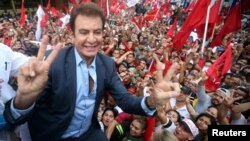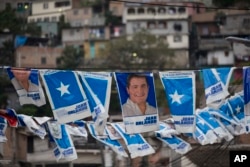A TV host was on course for victory in the Honduran presidential race on Monday, in a dramatic election that upended forecasts of a win for the country's U.S.-friendly incumbent.
Flamboyant entertainer Salvador Nasralla, 64, was ahead by a 5 point margin with 70 percent of ballots counted, election official Marcos Ramiro Lobo told Reuters.
That was too large a lead for his rival, center-right President Juan Orlando Hernandez, to overcome, Lobo said.
He did not say what percentage of the vote Nasralla had, but an initial tally of more than half of ballots early on Monday gave Nasralla 45 percent, and Hernandez 40 percent.
The TV star helms a left-right coalition called the Opposition Alliance Against the Dictatorship. Thousands of his young supporters poured onto the streets of the capital Tegucigalpa on Monday waving red flags and cheering.
"Thank you so much," Nasralla told them outside the election tribunal office. "I don't have words for the emotion I feel right now."
One of the poorest nations in the Americas, Honduras has been blighted with years of gang violence, giving it one of the world's highest murder rates. Nasralla tapped into widespread disillusionment about the country's future, particularly among exasperated young voters.
"We want democracy, we want human rights to be respected and we want more jobs, so that there are more opportunities for the young so we can live dignified lives," said 25-year-old Samuel Padilla, a trained mechanic who had not found work in two years.
Nasralla is backed by former President Manuel Zelaya, who was ousted in a 2009 coup after he proposed a referendum on his re-election. The dramatic comeback by the one-time leftist appears likely to raise concerns in Washington.
Hernandez has not yet conceded defeat, however.
He said on Twitter on Monday evening that he was waiting for officials to ratify "the resounding triumph of the presidential election."
"This isn't over until it's over!" he said.
A second tribunal official told reporters more detailed results could come later on Monday, or even Tuesday.
But Lobo said Nasralla now appeared certain to win. "The technical experts here say that (Nasralla's lead) is irreversible," he told Reuters.
On Monday afternoon, the unrelated Luis Zelaya, the third-placed candidate, said Nasralla was the country's new president and urged Hernandez, 49, to accept defeat.
Hernandez was the longtime favorite, credited with lowering the murder rate and lifting economic growth. But he has also been hurt by accusations of ties to illicit, drug-related financing, which he denies.
His attempt to clinch a second term, which was made possible by a 2015 Supreme Court decision on term limits, also divided opinion in Honduras.
Risk for United States?
Washington sees Hernandez as a reliable ally in tackling drug trafficking and gangs, and helping control the flow of migrants to the United States. Nasralla at the helm would take the United States into unfamiliar territory.
"Now he can back up his anti-corruption positions. Or not," a U.S. official said, noting the U.S. government expects to work "co-operatively in a number of ways" with Nasralla.
The United States has longstanding military ties to Honduras and few ideological allies among the current crop of Central American presidents. In Mexico, leftist Andres Manuel Lopez Obrador leads opinion polls for next year's presidential election.
Nasralla describes himself as a centrist, who "takes the best of socialist ideology." He says he supports free markets and views private enterprise as the best way of creating jobs and slowing migration.
"We are going to have good relations with the United States and all countries," he said before the election, adding he was happy to work with U.S. President Donald Trump.
Many believe coalition coordinator Zelaya is the true force behind Nasralla. Although Zelaya is viewed as a traditional Latin American leftist, Honduras business figures say he is a political opportunist who often reneges on his word.
The son of a wealthy landowner, Zelaya nearly returned to political prominence in the 2013 election, when his wife lost to Hernandez. Zelaya, who wears a big black mustache and cowboy hats, is a larger than life personality whose supporters fete him for having boosted minimum wages.
Nasralla is one of the country's best known faces as the host of game shows that feature scantily-clad women by his side.
With his booming voice and finely coiffed hair, he looked poised to be the latest entertainment star in the Americas to breach the upper echelons of political power.
In Guatemala, former TV comedian Jimmy Morales won the presidency in 2015, but his support has eroded after he clashed with a U.S.-backed anti-graft body investigating his family.






